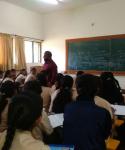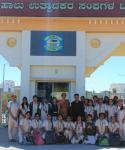The Electronics & Communication Engineering program was started in the year 1980. The focus of the department is to produce technicians with strong fundamentals in electronics and communication domain. The plan is underway to adopt outcome based education system to help students to achieve the goal. The department is the most sought after branch of engineering by toppers in SSLC examination (conducted by Karnataka Secondary Education Board) The department of Electronics and Communications Engineering has got experienced faculty & well equipped laboratories. The Department has organized many Guest lectures and workshops to enhance the knowledge in field of electronics and communication. Every year the dept. secures good results, placement & higher study opportunities.
VISION
To produce creative, innovative, dynamic, and ethical technologists who can lead in the ever-changing world of electronics and communication technologies
MISSION
To impart quality technical education to the students providing excellent teaching- learning environment and competitive curriculum in collaboration with industry through state-of-the-art infrastructure and resources.
To provide experience in teamwork, communications-oral, written and hands-on skills with the help of structured and unstructured real-world projects.
To create an environment to suit the needs of entrepreneurship.
To inculcate ethical values and leadership abilities in the minds of students to work towards the growth of the society.
Programme Educational Objectives (PEOs)
|
PEO -1 |
Competent carrier in industry to meet the needs of Indian and global companies or to become entrepreneur in the field of Electronics and Communication Engineering.
|
|
PEO -2 |
Work in individual capacity and in teams under multidisciplinary domains exhibiting social responsibilities. |
|
PEO -3 |
Life-long learning for sustainable development and practice professional ethics in multi-dimensional capacity. |
|
PEO - 4 |
Application of mind, creativity, innovation in the emerging areas of technology. |
Program Outcomes
-
PO – 1
Basic and Discipline specific knowledge: Apply knowledge of basic mathematics, science and engineering fundamentals and engineering specialization to solve the engineering problems.
PO – 2
Problem analysis: Identify and analyze well defined engineering problems using codified standard methods.
PO – 3
Design/Development of solutions: Design solutions for well defined technical problems and assist with the design of system components or processes to meet specified needs.
PO – 4
Engineering Tools, Experimentation and Testing: Apply modern engineering tools and appropriate technique to conduct standard tests and measurements.
PO – 5
Engineering practices for society, sustain ability and environment: Apply appropriate technology in context of society, sustainability, environment and ethical practices.
PO – 6
Project Management: Use engineering management principles individually, as a team member or a leader to manage projects and effectively communicate about well-defined engineering activities.
PO – 7
Life-long learning: Ability to analyze individual needs and engage in updating in the context of technological changes.








